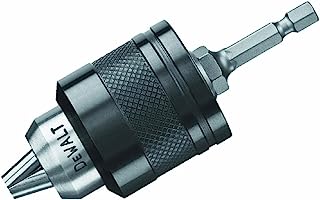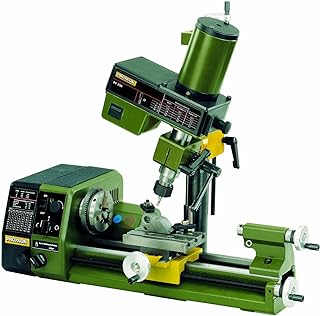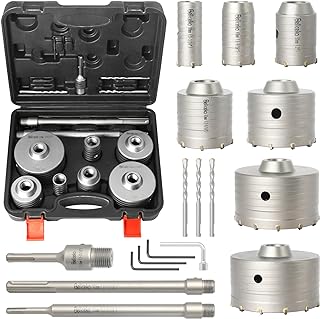When buying a hole saw for concrete, it’s important to consider several factors for the best results. The tool you choose can make a big difference in how well your project goes, so it’s crucial to look at all the options carefully. Everything from the material the blade is made of to whether it works with different types of concrete can affect how successful your project is. Whether you’re a beginner or an expert, it’s essential to understand these factors in order to find the right hole saw for cutting through concrete easily.
See our guide to the best hole saw for concrete.
Material composition of the hole saw
When buying a hole saw for cutting concrete, it’s important to consider the material it’s made from. This might seem like a small thing, but it actually makes a big difference in how well the tool works and how long it lasts. Choosing a hole saw that’s made of high-quality materials like carbide or diamond-tipped can really improve your experience when cutting tough concrete surfaces. These materials are strong and durable, so your hole saw will stay sharp and cut efficiently even after using it a lot.
While a hole saw with top-notch materials might cost more at first, it’s worth it in the long run. Cheaper options made from lower-quality materials might save you money initially, but they wear out quickly and don’t work as well. Investing in a hole saw with strong materials means you’re not just buying a tool – you’re getting precision, efficiency, and longevity. Remember, when you’re looking at all the options out there, the material your hole saw is made from is a key factor that can really improve your concrete cutting experience.
Size/diameter of the hole saw
Choosing the correct hole saw for concrete projects is crucial for success. The size and diameter of the blade are important factors to consider. Using a hole saw with the right dimensions can make drilling more efficient and accurate.
While a larger diameter may seem like a good choice for faster results, it’s important to think about the type of concrete you’re working with. Thicker concrete may require a smaller diameter to avoid straining the tool and get a cleaner cut.
A smaller hole saw can offer more precision and control, especially for delicate projects where accuracy is key. It’s important to find a balance between the size of the hole saw and the density of the concrete for the best results.
By carefully evaluating the requirements of your project and choosing a hole saw that meets those needs, you can improve the quality of your work and have a smoother drilling process. Remember, it’s not just about the measurements but about finding the right fit for a job well done.
Compatibility with the drill
When you’re buying a hole saw for drilling into concrete, it’s important to make sure it will work with your drill. Skipping this step could cause problems and waste your time. For a successful drilling experience, you need to do some research to make sure the hole saw you pick is right for your specific drill.
Using tools that don’t match can lead to problems and frustration when drilling. It’s crucial to choose a hole saw that fits your drill perfectly to ensure good performance. By getting a compatible hole saw, you’ll protect your equipment and make your concrete drilling projects more efficient and effective. Remember, to drill well, your drill and hole saw need to work together smoothly.
Durability and longevity of the hole saw
When choosing a hole saw for drilling concrete, it’s important to prioritize durability and longevity. Investing in a high-quality hole saw made for concrete drilling can save you money in the long run and make your drilling experience smoother and more efficient. While cheap hole saws may seem like a good deal at first, they tend to wear out quickly and can lead to frustrating drilling performance.
Choosing a hole saw with specialized carbide tips or diamond-coated edges can make a big difference in how long it lasts. These materials are designed to handle the tough nature of concrete, giving you precise cuts and reliable performance over time. Checking the brand’s reputation and manufacturing quality can also ensure your hole saw can handle even the toughest concrete drilling tasks.
In the end, it’s important to prioritize durability and longevity when choosing a hole saw for concrete drilling. This will not only make your projects easier but also set you up for success in the long run.
Precision and accuracy of the cut
When buying a hole saw for cutting concrete, it’s important to focus on precision and accuracy. Choosing a high-quality hole saw can make a big difference in your projects. Cheaper options might be tempting, but they often don’t have the durability and sharpness needed for concrete. A well-made hole saw not only gives you precise cuts, but also makes your work faster and easier. By picking a tool that values precision and accuracy, you set yourself up for success and professional-looking results when cutting concrete.
Achieving perfect cuts with a reliable hole saw is very satisfying. Whether you’re a pro or a DIYer, having a tool that consistently delivers precise cuts improves the quality of your work and boosts your confidence when working with concrete. Precision isn’t just about looks – it also affects how sturdy your creations are. A clean cut ensures that any fixtures or fittings you add fit securely, giving your project a polished finish. In concrete cutting, precision and accuracy are essential for top-notch work, and getting a high-quality hole saw is a must for achieving great results every time.
Conclusion
To wrap up, getting a top-notch hole saw made for concrete is crucial for getting accurate and efficient results in construction work. These tools are strong, cut precisely, and save time, which can really help improve your work. By picking the right hole saw for concrete, you guarantee a polished result and save time and energy, making it a worthwhile tool for anyone who enjoys DIY projects or works as a pro contractor.


